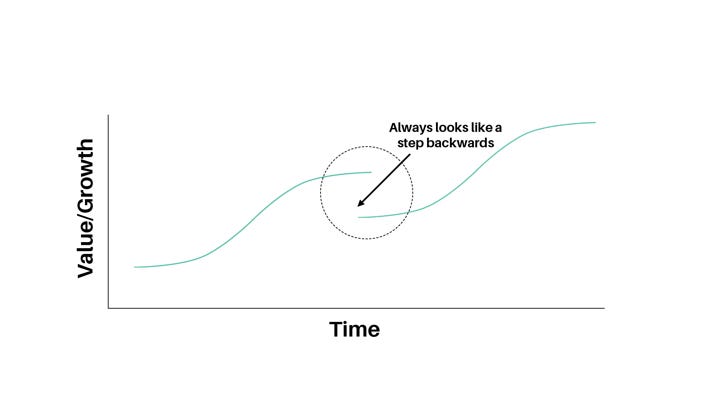
Johann Sebastian Bach ingeniously balanced two opposing, contradictory forces in music. One of these forces is known as diatonicism and the contradictory force is known as chromaticism.
Diatonicism is the use of the normal seven tones of a standard musical scale. (the white notes on the piano to a musical layman like myself). It is the diatonic scale which is the foundation of a piece of music. This is “basic music” without any chromatic alterations.
Chromaticism is the use of the full 12 notes (the white and black keys on the piano) in musical composition. This gives music more colour, variation, depth and emotional range.
Bach was the pioneer in perfectly intertwining these two musical forces to achieve musical equilibrium.
Achieving Equilibrium in Business
To learn about this, just watch the brilliant lectures of Leonard Bernstein in Harvard. Bernstein explained that in musical history the growth of chromaticism came out of experimentation beyond the diatonic scale and eventually led to the intertwining of both as perfected by Bach.
Breaking this down in a business sense. Remembering that Diatonicism is the use of the basic seven tones, the white keys, if we are being true to ourselves, we admit most businesses operate within such confines. This is because they are measured on their performance of these seven keys. They are not measured on exploring the full range of keys, so very few businesses do so. Most companies don’t even have any way to measure such experimentation, a further deterrent to even trying.
The problem is by doing nothing — you risk losing everything. You may have a grand piano, the finest ever made and all your staff may be trained meticulously in playing those seven white keys. Meanwhile, a small startup who cannot afford a grand piano, crowd shares one or uses a cheap keyboard and because is not trained classically, she experiments. In today’s business environment this is happening in every industry. Big established companies who feel they have too much to lose by taking their eye off the cash cow allow smaller indie brands, startups and entrepreneurs into the market by innovating with regulation, with business models and most importantly, with new mental models.

Every company has change makers, mavericks and strategic leaders who see beyond the basic seven white keys, they see black keys, they see them being played together. They have an itch to play them. As with the history of music, they dabble, they experiment and eventually, some magic happens.
The problem is that playing with the keys they can see leads to incremental change. This is just like the advancement in music, you master one way and grow out of it, but so does everyone else. Real innovation happens when you can stretch what you see and see keys you had never considered before and then experiment and master new ways of playing.
Of course, all this magic can only happen if the strategic leaders are supported by those who are guardians over the diatonic way of doing things, the guardians of business as it is/was. Success only comes when those guardians become like Bach and realise that business mastery comes in synchronising two opposing ways of doing things.
“Every great idea starts out as a blasphemy.” — Bertrand Russell
For anyone reading who plays an instrument or someone in their family (or neighbour) does, you will know that mastery comes at a price. There will be wrong notes, bad notes, bad timing, asynchrony, good days and bad days, but persistence eventually pays off.
Understanding the Notes, the Patterns, The Direction

Most musical masters can read music, they have perfected where their fingers are, where they will go and when they play they are in perfect flow.
Many of us in business are playing without understanding the forces that are both coming and already upon us. No one is taught this in business school, yet they are playing the game amidst new rules. However, there are ways of understanding these forces, these patterns and this disruption. There are skills that can be imparted for business leaders to balance business as it is today while looking to how it will look and operate tomorrow. Mastery of synchronising two opposing, contradictory ways of doing things is a huge advantage. The challenge is that looking to the new keys always looks like a step back, this is because the infrastructure to succeed there is not mastered, not architected, not a business-as-usual model.

Business Innovation Mastery
True innovation comes from mastering opposing, contradictory forces, just like Bach did with music.
For businesses to succeed today they need to master contradictions more than ever before. It was easy when everyone was playing the same seven white notes. Now the keys are being disaggregated and the piano unbundled, everyone can play.
This is a much different playing field.
What are your contradictions that should be considered and then mastered?
Here are some contradictions worth considering:
• We need to execute big and small
• We need to be systematic and chaotic
• We need to act professional and amateur
• We need to be grown up and childlike
• We need to be logical and imaginative
• We need to be ‘in the now’ and also ‘on the then’
• We need to be ‘on the business’ and ‘in the business’
• We need to act fast and slow
• We need to be visionary and grounded
*******************************************************************
On this week’s innovation show we talk to Maura Nevel Thomas, an expert on the topics of productivity, attention management, and work-life balance. She is a speaker, trainer, and author of Work Without Walls and Personal Productivity Secrets. You can find out more about Maura here maurathomas.com.
We talk about our waning attention spans, how we are training ourselves to have less focus. In the current shift to a knowledge worker economy, where we do most of the work with our brains, we must protect those brains. Deep work is essential and so is the ability and environment to perform it.
We talk about the workplace, open space working, email culture and personal hacks to overcome email fatigue, which accounts for half of our workdays every day. We talk about leadership understanding the outputs of knowledge work and telecommuting and what it means to the workplace and leadership.
The show is broadcast on RTÉ Radio 1 extra 3 times weekly and on iTunes, TuneIn and Google play. The website is here and below is Soundcloud.